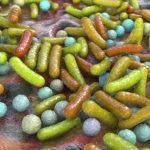By David Blyweiss, M.D., Advanced Natural Wellness
November 15, 2021
How often do you think about your urine?
Most certainly when you HAVE TO PEE RIGHT NOW… and there are ten people ahead of you in the bathroom line. When that happens, pee is the ONLY thing you can think about.
Urine is likely on your mind if it hurts when you take a pee. Or if you have a hard time peeing.
And you’re definitely going to think about your urine if you look into the toilet and see a color you don’t associate with pee. That can be extremely alarming!
It may sound strange, but checking out the color of your pee is a great way to find out what’s going on inside your body.
Open your arteries, improve blood flow for a new health miracle...
Did you know your circulatory system has over 60,000 miles of arteries, veins and other blood vessels, if stretched end to end?
But as you age, your blood vessels undergo changes, which may cause them to stiffen, thicken and get clogged.
GOOD NEWS! Doctors have now identified a “Miracle Molecule” inside your arteries that helps OPEN your arteries and IMPROVE blood flow.
It’s what Dr. Valentin Fuster calls it, "One of the most important discoveries in the history of cardiovascular medicine."To you, that means...
- Healthy blood pressure
- Sharper mind and memory
- Skyrocketing energy and muscular strength
- Increased pleasure and passion in the bedroom
- Improved circulation to every cell and organ in your body
Go here to discover a new natural way to significantly boost the levels of this miracle molecule in YOUR body NOW!
For example, your urine can tell you whether or not you’re dehydrated. If it’s pale, light yellow or clear, you’re drinking enough fluids. If it’s a mucky dark yellow to orangish or brownish color, you’re not drinking enough and a tall glass of water is in order.
So that’s one thing your urine can tell you.
But urine comes in many colors, and they can all mean something different. Sometimes it’s cause for alarm. Most times it’s not.
Why is My Urine a Weird Color?
If you look in the toilet and see that it’s lit up with neon blue urine, you might feel a surge of panic. But if you think back, you’ll probably remember eating something unusual – like that blue snow cone or slushy you had at the park – earlier in the day.
A lot of unusual urine colors are this easy to resolve. But sometimes it might be more serious and require closer monitoring.
So let’s take a look at the rainbow of colors you might find in the toilet bowl, and what they could mean.
Are You Suffering From...
- Love handles and a pot belly
- Romance that isn't what it used to
- Forgetfulness and inattention
- Low (or no) strength and endurance
- A sex drive that's shifted into neutral...or worse
If so...you may have Mature Male Burnout. Click here to discover more about this unique condition and what you can do about it.
Bright “neon” yellow urine is typically nothing to worry about… as long as you’re taking a vitamin supplement or B-complex formula that contains vitamin B2, or riboflavin. It’s just your body’s way of excreting what it doesn’t need.
Orange pee can be caused by eating too many carrots. If you’ve ever met a carrot lover, you’ll notice that their skin can have an orange tint to it from the excess beta carotene. All of that extra beta carotene comes out in the urine, too. Pyridium, which we give for people with urinary tract infections to numb the urethra while peeing will also turn your urine orange. So it’s generally not a concern.
However, persistent orange-colored urine that’s not caused by food or medications could also be a liver or bile duct condition.
Urine that’s green or blue can happen after taking certain antacids such as Tums or Pepto-Bismol. Some food dyes can have the same effect. And eating a lot of asparagus can give your urine a green tint.
But occasionally, urinary tract infections (UTIs) that are caused by a specific bacteria can cause you to produce green urine.
Pee that is suddenly reddish or pinkish could be fairly benign. Especially if you just had some strenuous exercise and happen to be dehydrated. Or if you’re on some medication that has this side effect. Or if you’ve been eating beets.
Or it could be a sign of something more serious, like some form of kidney disease. If you’re a guy, you could have an enlarged prostate. In both men and women it could indicate cancer in the bladder. Classically you might have a urinary tract infection. Of if you’re sexually active, a sexually transmitted infection (STI). Reddish or pinkish urine on a regular basis should always be checked out.
Brown urine can easily be caused by the foods you eat. Beets, rhubarb, fava beans and food colorings can all cause your pee to turn brown. Dehydration can also make your urine turn the color of tea.
But if you drink extra water and your pee stays brown, it could be an indication of hepatitis or cirrhosis, which both cause excess bilirubin to build up in the urine.
So unusually colored urine could be caused by certain foods or medications. Or it could be a sign of a health problem.
What is that Weird Smell?
My urine always smells a lot like burnt asparagus after I take alpha lipoic acid. It’s surprising to catch a whiff of this odor when you haven’t eaten asparagus recently, but it’s harmless. Asparagus, grape juice, cabbage and garlic are all foods that can affect the smell of your pee. And if you take a B6 supplement, you’re going to smell it in your urine.
But if your urine is cloudy or has a very strong unpleasant smell, you could have a UTI. Maybe kidney stones or liver dysfunction. And a fruity smell could indicate blood sugar problems.
And what about foamy urine?
It generally isn’t reason for alarm. Bubbly or foamy urine can be caused by excess protein, or simply the force of your urine stream. However, foamy urine is a classic, very early sign of kidney disease – which could lead to kidney failure.
So keep an eye on the color of your urine and note any unusual odors. If you have any sudden changes – or long-term abnormalities not caused by food or medication – you need to get to your doctor.
SOURCES:
Perrier ET, Johnson EC, McKenzie AL, Ellis LA, Armstrong LE. Urine colour change as an indicator of change in daily water intake: a quantitative analysis. Eur J Nutr. 2016;55(5):1943-1949.
What The Color of Your Pee Says About You. News Article. Cleveland Clinic. Sept 2020.






